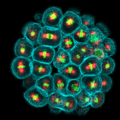Wiki Science Competition
| Wiki Science Competition | |
|---|---|
 Official logo of Wiki Science Competition | |
 | |
| Genre | Scientific photography, Nature photography, Scientific illustration |
| Begins | 1-15 November [1] |
| Ends | 1-15 December [2] |
| Location(s) | Worldwide |
| Years active | 6 |
| Inaugurated | 2017 |
| Most recent | 2023 |
| Participants | Photographers, researchers, students |
| Organised by | Wikipedia community members |
| Website | wikisciencecompetition.org |
The Wiki Science Competition (WSC) is a global science photography competition for students, researchers, and others to contribute freely licensed high-quality, well-sourced images and other media to Wikimedia Commons.[3][4]
It evolved from the Estonian Science Photo Competition. The first global competition took place in 2017[5] and is held every two years,[6] occurring for most countries around November or December.[7][8] It has been called one of the most important photo competitions in the world.[9] The main organizer of the competition is Ivo Kruusamägi.
The first competition saw participation from over 2,200 contestants, with the number of images exceeding 10,000.[4][6] In 2023 there were more than 7,500 photos submitted.[10]
In 2017, there were five categories: People in Science, Microscopy images, Non-photographic media, Image sets, and a General category. In 2019, a new category, Nature, was added; in 2021, Astronomy was added.[11] A special prize for "Women in STEM" is also offered.[5]
Media are evaluated based on the detail of their description, with sources from high-impact journals, datasets, and other reliable third-parties being prioritized. This incentivizes expert-driven contributions backed by verifiable materials.
Among the countries were it has been launched and regularly held there are Estonia, Switzerland, Ireland, United States, Poland,[12] Ukraine, and Russia (where it is held in Spring).[13]
Winners
[edit]-
Cross-section of the parasite Ascaris under 200x magnification. Winner of the Microscopy images category 2017, Massimo Brizzi, Italy
-
A polar diver going through ice near the French Antarctica station. Winner of the People in Science category 2017, Erwan Amice, France
-
Two LIGO scientists trying to detect what is causing laser technical issues. Winner of the People in Science category 2019, Nutsinee Kijbunchoo, USA/Thailand
-
A birthing water flea under 100x magnification and polarized light. Winner of the Microscopy images category 2019, Marek Miś, Poland
-
The simulated polarization of the Milky Way's dust as microwave radiation in the sky. Winner of the Non-photographic media category 2019, Uroš Seljak
-
Archaeological excavation of a Middle Paleolithic site in Tuscany, Italy. Winner of the General category 2019, Stefano Ricci Cortili, Italy
-
A larva of a non-biting midge under polarized light. Winner of the Microscopy images category 2021, Karl Gaff, Ireland
-
A California red-sided garter snake in its natural habitat. Winner of the Nature category 2021, Jaden Clark, USA
-
The supernova remnant Jellyfish Nebula (IC443) and its surroundings. Winner of the Astronomy category 2021, Ram Samudrala, USA
-
Macrophotography of the eggs of a fire salamander taken a few days after laying. Winner of the Wildlife and Nature category 2023, Pablo Jimenez Velayos, Spain
-
Blastula-stage sea urchin embryo. Winner of the Microscopy images category 2023, Aude Nommick, France
-
Wildlife photographer wearing a ghillie suit. Winner of the People in Science category 2023, Giles Laurent, Switzerland
See also
[edit]References
[edit]- ^ most common starting date
- ^ most common ending date
- ^ Graziosi, Roberto (21 March 2018). "Scienze Wiki Science Competition: i vincitori". Focus (in Italian).
- ^ a b Fuoco, Michele (10 November 2018). "Le foto a muffe e batteri di Stefania Rizzelli diventano opere d'arte". Gazzetta di Modena (in Italian). Retrieved 21 September 2023.
- ^ a b Gorey, Colm (1 Nov 2017). "Irish Wikimedia community issues calls for best science photographers". Silicon Republic. Retrieved 6 August 2023.
- ^ a b "PHOTOS | See what are the best science photos in Estonia" Delfi Forte, 13 February 2018
- ^ Nüesch, Danja (6 November 2017). "Wikimedia-Fotowettbewerb - So wunderschön kann Wissenschaft sein" [Wikimedia Photo Contest - How beautiful science can be]. Schweizer Radio und Fernsehen (in German). Retrieved 6 August 2023.
- ^ Lausson, Julien (October 26, 2019). "En novembre, sortez vos smartphones pour photographier la science et aider Wikipédia". Numerama (in French). Retrieved August 15, 2023.
- ^ Paolo Riva; Elisa Manca (22 May 2022). "Istituto Dalle Molle in Fotografia e a cosa serve la Realtà Virtuale (1./3)". RSI Rete Uno (in Italian). Retrieved 2023-08-16.
- ^ Oidermaa, Jaan-Juhan (December 18, 2024). "Estonian scientific photographers nab several recognitions at Wikipedia contest". ERR Novaator. Retrieved December 20, 2024.
- ^ "SVIZZERA Wikimedia CH lancia un concorso internazionale di fotografia scientifica" (in Italian). Retrieved August 17, 2023.
- ^ Ratković, Nebojša; Jerchel, Paul; Hsing, Pen-Yuan; Sielicka-Baryłka, Klara (2020). "Wikipedia and Its Sister Projects as Important Elements of the Teaching and Learning Process – a Review of the Global Situation". Łódzkie Studia Etnograficzne. 59: 107–126. doi:10.12775/LSE.2020.59.07. ISSN 2450-5544.
- ^ "Объявлен старт конкурса «Снимай науку!»" [The start of the contest "Shoot Science!" has been announced.]. Nauka i Zhizn (in Russian). 2 April 2019. Retrieved September 22, 2023.











